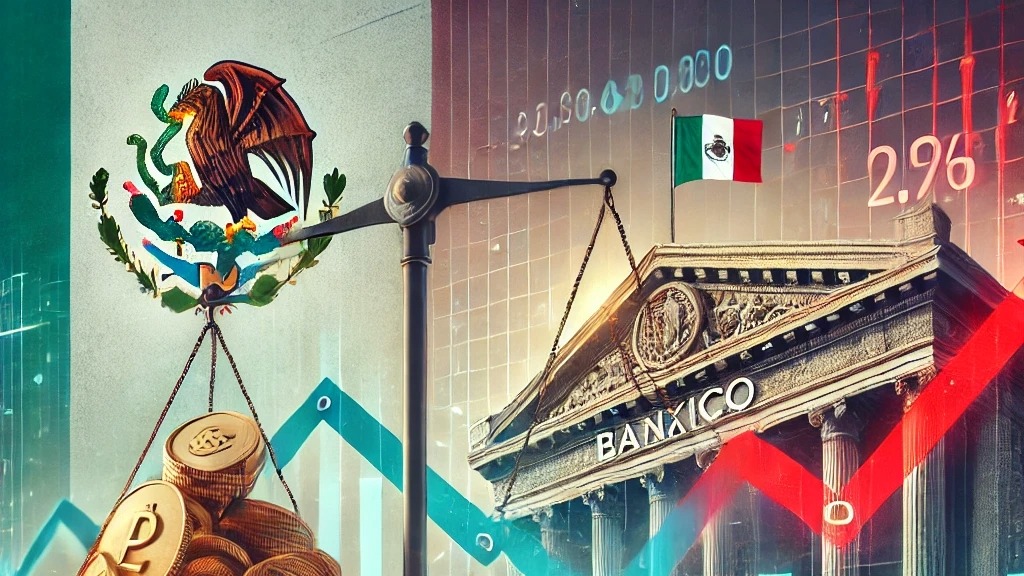Dollar rallies on slowdown in U.S. inflation

The U.S. dollar pared losses against a basket of currencies after consumer price index data showed inflation is slowing. The dollar index, which tracks the U.S. currency against six of its major peers, stood at 102.59, down 0.04%.
Recent economic developments in the U.S. have captured the attention of investors and business leaders alike. On Monday, the New York Fed released its latest household survey, revealing a significant decline in three-year inflation expectations, which now stand at 2.3%, the lowest level in the 11-year history of the series. This data is particularly relevant for companies, as it suggests a possible stabilization of prices in the medium term, which could facilitate financial and cost planning. This scenario of stability presents both strengths and opportunities for Mexican companies, especially those that depend on foreign trade and economic relations with the United States. The Mexican market's ability to adapt to these changes is a strength that allows it to take advantage of more predictable conditions in imported input costs and maintain export competitiveness.
Prior to the pandemic, inflation expectations remained at moderate levels, and recent data suggest that this "old normal" may be making a comeback. For businesses, this means a less volatile pricing environment, which could improve the ability to forecast and make strategic decisions with greater confidence. Stability in inflation expectations also reduces pressure on profit margins, allowing companies to focus on growth and innovation rather than managing inflationary risk. However, it is crucial to recognize the weaknesses of the Mexican market, such as its economic dependence on the United States, which makes it vulnerable to unexpected changes in the Federal Reserve's monetary policy. An adjustment in interest rates could generate volatility in the exchange rate, negatively affecting companies operating in dollar-sensitive sectors.
On Wednesday, the U.S. dollar pared its losses against a basket of currencies after the consumer price index showed a slowdown in inflation. Although the currency still showed a slight decline, this moderation in losses reflects less concern about aggressive interest rate cuts by the Federal Reserve.
For companies operating in international markets, a relatively stable dollar is crucial. A stronger or weaker dollar can have significant effects on operations, from the cost of imports and exports to competitiveness abroad.
The easing of inflationary pressure could lead the Federal Reserve to maintain a less aggressive monetary policy stance, which would benefit companies by keeping borrowing costs under control. However, the possibility of an unexpected tightening of monetary policy remains a latent threat to the Mexican market, which could face a more complex environment if global economic conditions change abruptly.
The recent July National Federation of Independent Business (NFIB) survey indicated that while inflation remains the main problem for small businesses, signs of relief are beginning to emerge. The net number of small businesses planning to raise prices has fallen to the lowest level since April 2023. This suggests that cost pressures are beginning to ease, which could mean respite for small businesses that have been dealing with tight margins due to high costs. In addition, the drop in the number of owners expecting to increase employee compensation also indicates a reduction in wage inflationary pressures. While this may seem negative for the workforce, from a business perspective, it suggests greater stability in labor costs, allowing companies to better plan their budgets and maintain profitability. This outlook presents opportunities for Mexican companies, especially in sectors where cost stability is crucial for competitiveness, such as manufacturing and exports.
Financial markets have adjusted their inflation expectations, reflected in the "breakeven" inflation rates of Treasury-protected securities (TIPS), which have moved closer to the Fed's 2.0% target. This is an important development for businesses, as it suggests that markets expect inflation to remain under control for the foreseeable future. Stable and predictable inflation is beneficial for businesses, as it reduces uncertainty in costs and prices, facilitating long-term planning. However, the threats that still persist in the global economic landscape should not be underestimated. Volatility in the financial markets and possible fluctuations in international monetary policies could destabilize the current favorable environment.
In summary, recent data on inflation and the dollar's reaction offer mixed but mostly positive signals for the business environment. Lower inflation expectations and a stable dollar may provide a more predictable environment for businesses, both large and small, allowing them to focus on growth and innovation rather than economic risk management.
For business leaders in Mexico, this is an opportune time to review their pricing and cost strategies, take advantage of easing inflationary pressure, and plan for the long term with greater confidence in a more stable economic environment. However, it is critical that these companies maintain a flexible strategy to mitigate weaknesses and threats, and be prepared to respond quickly to changes in the global economic environment. Maintaining a clear and proactive vision will be essential to successfully navigate this complex global environment, maximizing the strengths of the Mexican market while taking advantage of the opportunities presented by the current economic context.
Collaboration: Editorial Auge.






